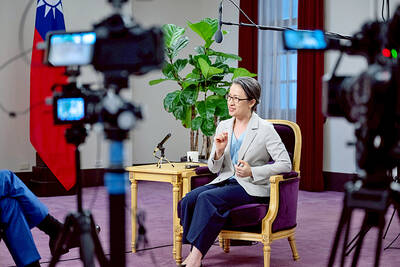The government will not raise water and electricity rates, despite skyrocketing oil prices, a Cabinet official said on Friday.
Executive Yuan Secretary-General Chen Chin-jun (陳景峻) made the statement amid widespread speculation that domestic gasoline prices would rise substantially next month, which would also drive up water and electricity prices.
Chen said CPC Corp, Taiwan, the state-run oil company, has not raised the price of oil in its sales to Taiwan Power Co in an effort not to increase the company's costs.
In real terms this means the government is subsidizing Taipower with NT$35 billion (US$1.1 billion) as part of its efforts to stabilize electricity prices and maintain consumer price stability, Chen said.
Chen said the Cabinet had also approved a draft electricity bill at a meeting earlier this week, which would encourage the use of various means to develop electricity, including private investment.
He also called on the public to conserve water, saying that water prices would not be adjusted upward, even though water treatment costs had already surpassed the water selling price.
Premier Chang Chun-hsiung (
He said he had asked a special task force under the Ministry of Economic Affairs to keep an eye on the supply and demand of raw materials.
The task force will implement measures such as halving import duties and limiting export items, to ensure price stability, he said.
The Fair Trade Commission is also paying close attention to the market to prevent people from illegally profiting by inflating commodity prices, Chang said.

China might accelerate its strategic actions toward Taiwan, the South China Sea and across the first island chain, after the US officially entered a military conflict with Iran, as Beijing would perceive Washington as incapable of fighting a two-front war, a military expert said yesterday. The US’ ongoing conflict with Iran is not merely an act of retaliation or a “delaying tactic,” but a strategic military campaign aimed at dismantling Tehran’s nuclear capabilities and reshaping the regional order in the Middle East, said National Defense University distinguished adjunct lecturer Holmes Liao (廖宏祥), former McDonnell Douglas Aerospace representative in Taiwan. If

TO BE APPEALED: The environment ministry said coal reduction goals had to be reached within two months, which was against the principle of legitimate expectation The Taipei High Administrative Court on Thursday ruled in favor of the Taichung Environmental Protection Bureau in its administrative litigation against the Ministry of Environment for the rescission of a NT$18 million fine (US$609,570) imposed by the bureau on the Taichung Power Plant in 2019 for alleged excess coal power generation. The bureau in November 2019 revised what it said was a “slip of the pen” in the text of the operating permit granted to the plant — which is run by Taiwan Power Co (Taipower) — in October 2017. The permit originally read: “reduce coal use by 40 percent from Jan.

‘SPEY’ REACTION: Beijing said its Eastern Theater Command ‘organized troops to monitor and guard the entire process’ of a Taiwan Strait transit China sent 74 warplanes toward Taiwan between late Thursday and early yesterday, 61 of which crossed the median line in the Taiwan Strait. It was not clear why so many planes were scrambled, said the Ministry of National Defense, which tabulated the flights. The aircraft were sent in two separate tranches, the ministry said. The Ministry of Foreign Affairs on Thursday “confirmed and welcomed” a transit by the British Royal Navy’s HMS Spey, a River-class offshore patrol vessel, through the Taiwan Strait a day earlier. The ship’s transit “once again [reaffirmed the Strait’s] status as international waters,” the foreign ministry said. “Such transits by

Taiwan is doing everything it can to prevent a military conflict with China, including building up asymmetric defense capabilities and fortifying public resilience, Vice President Hsiao Bi-khim (蕭美琴) said in a recent interview. “Everything we are doing is to prevent a conflict from happening, whether it is 2027 or before that or beyond that,” Hsiao told American podcaster Shawn Ryan of the Shawn Ryan Show. She was referring to a timeline cited by several US military and intelligence officials, who said Chinese President Xi Jinping (習近平) had instructed the Chinese People’s Liberation Army to be ready to take military action against Taiwan